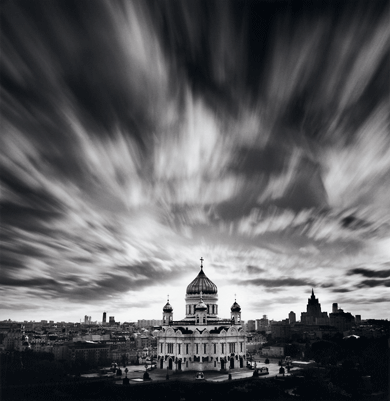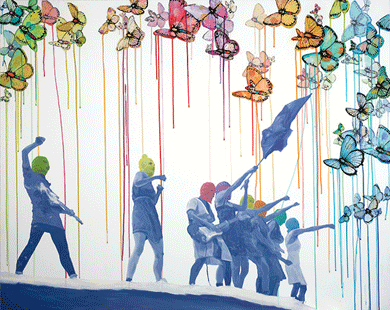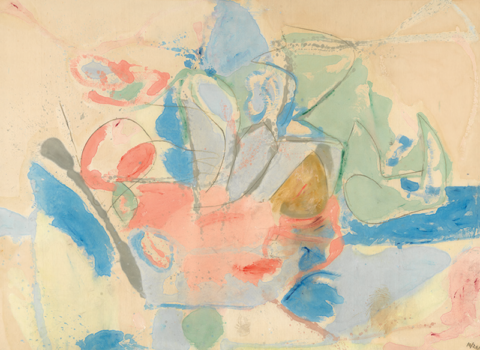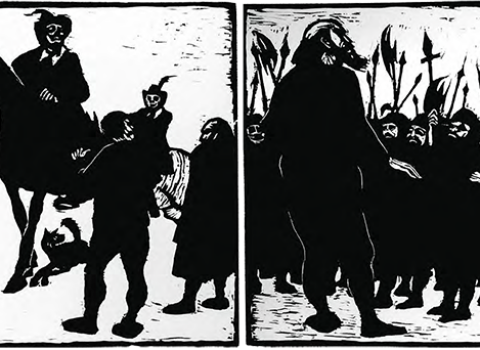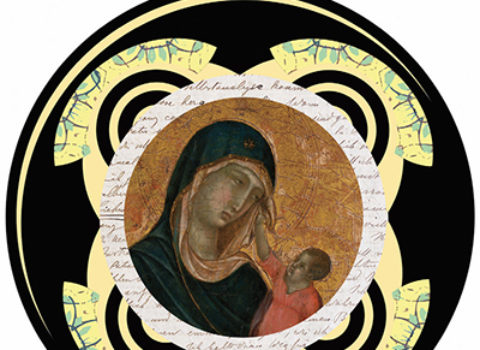When five brightly balaclava’d members of the Pussy Riot collective climbed atop the altar of Moscow’s Cathedral of Christ the Savior in February 2012 to chant “Our Lady, Chase Putin Out!,” they became celebrities; five months later, when Yekaterina Samutsevich, Maria Alyokhina, and Nadezhda Tolokonnikova answered the state’s charge of hooliganism, they became heroes. Their closing statements turned a show trial into The Death of Socrates. Samutsevich criticized the government’s exploitation of Orthodox symbols, Alyokhina lamented political apathy, and Tolokonnikova insisted that their action, which was sending them to prison, had really set them free. Accused of religious hatred, she offered spiritual wisdom. “A human being is a creature that is always in error, never perfect,” she said. “She quests for wisdom, but cannot possess it. I think that Christianity . . . supports the search for truth and a constant overcoming of oneself, the overcoming of what you were earlier.”
“Constant overcoming of oneself” is a somewhat less media-ready maxim than Solzhenitsyn’s “Words will break cement,” which became a slogan for the group’s plight. (Tolokonnikova quoted it in her statement, and the journalist Masha Gessen used it as the title of a book.) But “constant overcoming” captures something at least as profound about the meaning of Pussy Riot’s “punk prayer”: a spirit of remaking, a seeking after truth that gladly risks ridicule and indignity, a rejection of pharisaical expertise. The Puritans used the term “visible saint” to describe the elect among them — those who had a message but, being human, no authority to speak it. Tolokonnikova, for what it’s worth, puts her faith in miracles. “I love miracles and strive for them. All of our activity is a quest for miracles.”
So she wrote in 2012 from Penal Colony No. 14 (PC-14) in Partsa, Mordovia, where she was held for nearly two years, until the eve of the Sochi Olympics. Her letter was addressed to the theorist-provocateur Slavoj Žižek, in a correspondence arranged by the French philosopher Michel Eltchaninoff. The exchange has now been published as comradely greetings: the prison letters of nadya and slavoj (Verso, $9.95). It’s a short volume — eleven letters, two of which date after Tolokonnikova’s release, as events in Crimea tilted toward annexation.
The conditions at PC-14 are notoriously inhumane. The inmates are beaten, denied sleep, fed rotten food, and forced to bathe from faucets that regularly burst with sewage. Bribes are routinely extorted. And prison, like Pussy Riot, has collective politics: when one person speaks out, everyone is punished. At first all this seems to Tolokonnikova like another opportunity for self-overcoming. “I’m fascinated to see how I’ll cope with all this,” she writes, bravely and heartbreakingly, in April 2013. Five months later she goes on a hunger strike.
Eltchaninoff’s introduction insists that “Nadya Tolokonnikova is not only a punk protestor, but a great intellectual” with “perfect mastery of the reference points of contemporary thought.” (Something may be out of joint with the critical climate when “reference points” are that which perfection demands.) His embarrassment at the contrast between a great male mind and a suffering female body is well-intentioned as far as it goes, but there is more to be gained from acknowledging difference than obscuring it. Comradely Greetings is a conversation between two different kinds of intellectual-activists with two different kinds of authority. Žižek proves that he respects Tolokonnikova by disagreeing with her, and at length: he rejects her description of Pussy Riot’s performance as Dionysian excess and explains (entertainingly!) Hegelian totality; Tolokonnikova challenges Western Marxists with the facts of life in a “Special Economic Zone.” Žižek’s letters are easily twice as long as hers, though of course he wasn’t writing them between sixteen-hour shifts at a broken-down sewing machine.
Tolokonnikova’s last letter explains that, since their release, she and Alyokhina have been working to create protest-training programs inside prisons, beginning with women’s camps. (Samutsevich was released in October 2012; none of the three are any longer members of Pussy Riot.) She remains loyal to her belief in revelatory, revolutionary speech, and seems unpersuaded by Žižek’s argument that “Masters” are necessary to liberate the masses. “Female prisoners are the ones most totally deprived of voice,” she writes. “Why is this so? Probably because women have long had inculcated into them a deep sense of weakness, of their need for a big, strong man . . . Our work is already turning up evidence that a lot of them buy into this garbage.”
The American anointing of Pussy Riot as victims of censorship and exemplars of free speech is one way to avoid admitting that what lies in their crosshairs is not just Russian oligarchy but also global capitalism. Peter Finn and Petra Couvée’s the zhivago affair: the kremlin, the cia, and the battle over a forbidden book (Pantheon, $26.95) tells the history of a Russian dissident more palatable to U.S. interests — Boris Pasternak. Finn is national-security editor at the Washington Post and a former Moscow bureau chief; Couvée is a writer, translator, and professor at St. Petersburg University who uncovered the role of Dutch intelligence in the publication of Pasternak’s novel. The Zhivago Affair contains the CIA’s first public acknowledgment of its role, though rumors have circulated to this effect for years.
Beloved as a poet, Pasternak was spared arrest and worse in the purges of the 1930s, even after he drew attention to himself by refusing to sign a state petition. He had strange, prophetic conversations with both Trotsky and Stalin, and somehow beguiled the latter, who regarded him with mystical awe. In late 1945 Pasternak began writing a novel and attracted suspicion during a new wave of crackdowns — the Union of Soviet Writers passed a resolution stating that the author was “lacking in ideology and remote from Soviet reality.” Maybe. Dr. Zhivago was a piece of historical fiction and made no concessions to the standards of socialist realism, but it was hardly critical of the revolution. (Not true of the David Lean film adaptation, which drips with aristocratic nostalgia.) Khrushchev admitted as much when he got around to reading it, in retirement. “We shouldn’t have banned it,” he said. “There’s nothing anti-Soviet in it.”
Pasternak knew better than to expect to publish Dr. Zhivago. But in 1956 a literary scout named Sergio D’Angelo visited him and obtained a copy for Giangiacomo Feltrinelli, an influential left-wing publisher from Milan. American interest was piqued: it was the era of the covert funding of The Paris Review, Radio Free Europe, and the Free Europe Press. The CIA was winding down its program of dropping propaganda from balloons over Eastern Europe and getting into mailing books through chinks in the Iron Curtain. (Later the books were given directly to tourists or traveling musicians.) Within fifteen years, more than a million volumes, including many miniature editions, were distributed to Soviet readers; the agency arranged for the translation of A Portrait of the Artist as a Young Man, Pnin, and Animal Farm, among others. The aim, in the words of a planning memo, was to “demonstrate the superior achievements of the West.” The CIA chief of covert action believed that books were “the most important weapon of strategic (long-range) propaganda,” a notion that Finn and Couvée compare to Maxim Gorky’s remarks at the First Congress of Soviet Writers in 1934: “Books are the most important and most powerful weapons in socialist culture.”
The case of Dr. Zhivago is dotted with close calls and copyright confusion. The University of Michigan Press almost scooped the CIA with their own edition, but operatives persuaded editors they would be putting Pasternak in danger. The book was printed in The Hague so that Dutch paper stock would “prove” that the United States hadn’t been involved. (Moscow wasn’t fooled.) Hundreds of copies were distributed through the Vatican pavilion at the 1958 Brussels World’s Fair — illegally, as no one had ever obtained the rights from Feltrinelli — and that October Pasternak received a unanimous vote from the Swedish Academy for the Nobel Prize. (The official citation recognized his poetry; of the three professors who nominated him, only one had read the novel.) Pasternak refused the award but was expelled from the writers’ union anyway — the only person who voted against the resolution was Stalin’s sister-in-law. In his remaining years Pasternak was denied royalties from the book, and after his death his mistress Olga Ivinskaya and her daughter, who’d received a briefcase of money from the Italians in a bit lifted from The Pink Panther, were sent to a labor camp.
Is Dr. Zhivago a good novel? Not according to Nabokov, who called it “a sorry thing, clumsy, trite, and melodramatic, with stock situations, voluptuous lawyers, unbelievable girls, romantic robbers, and trite coincidences,” and declared that Ivinskaya must have written it. (He may have been sore that anticommunism proved more popular than nymphets, capable of knocking Lolita off the top spot on the New York Times bestseller list.) Even those who admired Dr. Zhivago did so as one might an idiot savant. For a humanistic epic of love and war, no matter how trite, to come from a Russian pen — it was like finding a pearl in a mussel shell.
Sharing the Nobel short list with Pasternak in 1958 was Karen Blixen, who published under the name Isak Dinesen, and Alberto Moravia, whose psychologically brilliant agostino (New York Review Books, $14.95) is now available in a new translation by Michael F. Moore. Only Moravia could have written such a nasty and perfect “beach read.” Cutting and cunning, Agostino ranks with the bitterness of Boredom and the hollow wallow of Contempt.
We meet thirteen-year-old Agostino and his widowed mother at a seaside vacation spot, rowing a pattino across “the smooth, diaphanous early morning sea.” One day a young man joins them on their daily ride, and Agostino’s “big and beautiful” mother, “still in her prime,” begins to flirt. She used to jump easily in and out of the boat, but now she pretends to require help; she, who was so dignified and “serene,” now sings with happiness “in a melodious voice with pathetic trills that made Agostino’s skin crawl.” He hears her kisses with the young man, and they sound like choking. Rejected and angry, Agostino takes up with a band of rough boys who talk dirty, smoke cigarettes, and steal fruit under the wing of a six-fingered pederastic boatman. Agostino is wealthy and the gang is poor; he takes to dressing shabbily, and is eventually mistaken for the boatman’s son. A rich family pays him to row them out to sea.
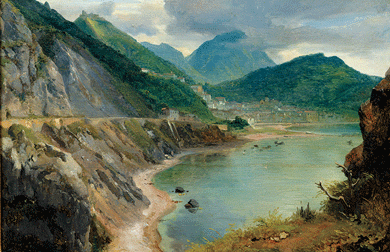
View of the Town and Gulf of Salerno, by Achille Etna Michallon © Musée Condé, Chantilly, France/Giraudon/The Bridgeman Art Library
Moravia said that Agostino’s “premise is the work of two great unmaskers, Marx and Freud,” and the book cannily shows clumsy sexual awakening intertwined with a vague, dawning awareness of class. Sickened at his mother’s body, Agostino realizes that she has been a woman all along; roughhousing with the gang, he learns what they do, or think about doing, to women. The final insult in this summer of shame is the boy’s inability to do the same. His mother unwittingly gives him the money to buy a whore, but the madam thinks he looks too young; the kindest of the cruel boys takes the cash and goes in without him. Flaubert’s Frédéric Moreau remembered his unconsummated flight from a brothel as his best time, innocent and irresponsible. These are Agostino’s worst days, days of powerlessness and hunger, stuck in the desert between thought and action.
Agostino failed to pass muster with Mussolini in 1941, when it was written, and three years elapsed before it could be published. But though Moravia was suppressed by the state, he is not so easy to resurrect as a protest artist. During the war he did a favor for the antifascists, and then a favor for the fascists. Years later he reflected on his equal-opportunity espionage with cold, wry distance. “All this seemed very literary to me, and therefore it amused me,” he said.

